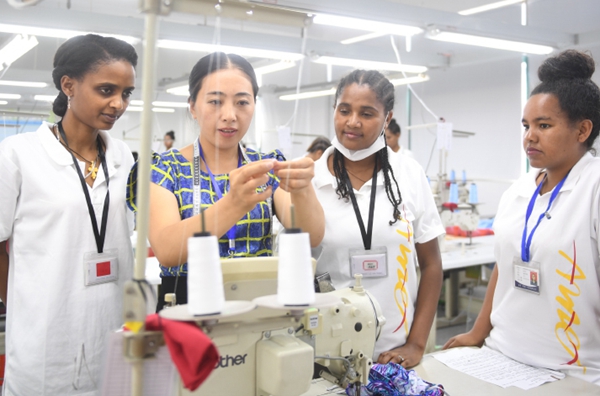Fifty years on, Ethiopia and China foster stronger cooperation on multiple levels
 0 Comment(s)
0 Comment(s) Print
Print E-mail ChinAfrica, December 28, 2020
E-mail ChinAfrica, December 28, 2020

Over half a century since the establishment of China-Ethiopia diplomatic relations in 1970, ties between the two countries have grown from strength to strength. In recent years, with the building of the China-Ethiopia comprehensive strategic cooperation partnership, both countries have deepened political mutual trust and achieved fruitful cooperative results in various fields.
On this celebratory occasion, ChinAfrica sat down with Ethiopian Ambassador to China Teshome Toga in Beijing to discuss the current and future state of relations between the two countries. Edited excerpts of his thoughts appear below.
ChinAfrica: What do you think have been the highlights of Ethiopia-China relations to date and how should they develop in the future?
Teshome Toga: In the last 50 years China and Ethiopia have cooperated in a lot of areas bilaterally as well as on issues that are of common concern to both at a global level. One highlight is political engagement, which is characterized by strong political trust and high level engagement between the two countries. In 2017, China and Ethiopia became comprehensive strategic partners.
We have also cooperated on regional issues like peace and security, climate issues, fighting terrorism and cooperating on UN reform programs. Recently China started contributing to Ethiopia's human resource development. We have an increasing number of Ethiopian students in China. We wish that this could increase and grow.
In addition, we have cooperation in transport technology. Ethiopia actually launched its first satellite just last year with the help of the China Academy of Space Technology.
The two countries also have strong aviation cooperation and Ethiopian Airlines is now the major African airline [operating between the two countries] with about 40 weekly flights from Chinese cities to Africa. This is expected also to increase the number of Chinese tourists to Ethiopia.
In future, we would like to see an increase in cooperation with China based on our achievements.
Chinese investment projects in Ethiopia have boosted our exports, generated foreign currency and helped with technology transfer, so we'd like to continue working with China to increase foreign direct investment. In the next 10 years, we will cooperate with China on e-commerce and online businesses that require technology.
We would like to improve trade with China so that the trade volume increases and at the same time the gap in trade also improves. We'd also like to add value to our products so that we sell at least semi-processed and fully processed products like coffee to Chinese consumers.
How do you think China-Ethiopia cooperation benefits Ethiopian people?
The benefit is obvious. China has 1,590 investment projects in Ethiopia. It means jobs have been created and about 300,000 Ethiopians have benefitted from these investment projects. This is a direct benefit.
Secondly, the infrastructure that has been built by the Chinese like better roads and rail can be used daily and also creates permanent and temporary jobs. This also boosts our exports and when exports rise we get more foreign currency, which in turn helps us and the economy.
Education cooperation is another area of benefit, because knowledge and skill means you can contribute to the development of your country.
Since the outbreak of the COVID-19 pandemic, China and African countries have helped each other in time of difficulties. What do you think about Ethiopia-China cooperation in jointly fighting the epidemic?
When novel coronavirus cases were reported [early this year] in Wuhan, a city that was most heavily hit by COVID-19 in China, Ethiopia was one of the first countries to reach out to China and express its solidarity and support. Ethiopian President Sahle-Work Zewde, Prime Minister Abiy Ahmed and Minister of Foreign Affairs Gedu Andargachew all communicated with their [Chinese] counterparts.
Ethiopian Airlines has been working with Chinese authorities throughout the pandemic and changed its passenger flights into cargo flights operating in four to five different cities in China. The airlines has also been a major supplier of medical equipment not only to Ethiopia and Africa as a whole, but also to Europe and Latin American countries. This is far beyond business and shows corporate social responsibility and we should commend the Ethiopian Government and management of Ethiopian Airlines and staff. We have also received criticism that we should stop these operations but we stood in solidarity with the people and government of China.
We had about 300 Ethiopian students in Wuhan. They stood bravely with the people of Wuhan in solidarity. No Ethiopian student was evacuated from Wuhan and thankfully none of them was infected. Friends always stand together in times of happiness and in times of difficulties. This is what we did.
But in return, I should also mention that the Chinese Government, private sector, and government sector were the leaders in supplying Ethiopia and Africa with large quantities of medical equipment and supplies. Ethiopia was amongst the first countries to receive Chinese medical experts experience in dealing with COVID-19 who shared their knowledge with their Ethiopian counterparts.
China is Ethiopia's largest trading partner, source of investment, and development partner. How can China-Ethiopia economic cooperation be strengthened to alleviate the impact of the pandemic?
The pandemic has slowed down economic activities in Ethiopia. Now the government needs to support industries that have been out of production or that slowed down production and we have been trying to do that.
Our hope is that in the post-COVID-19 recovery period the economic cooperation with China will continue. We also need more foreign direct investment and increased trade with China. We want to send more products to China. We are promoting our products as well as promoting new tourism for visitors from China. We are calling on the Chinese private sector to do more in Ethiopia. Post-COVID-19 recovery needs additional finances which we need to strengthen these mechanisms.






Go to Forum >>0 Comment(s)